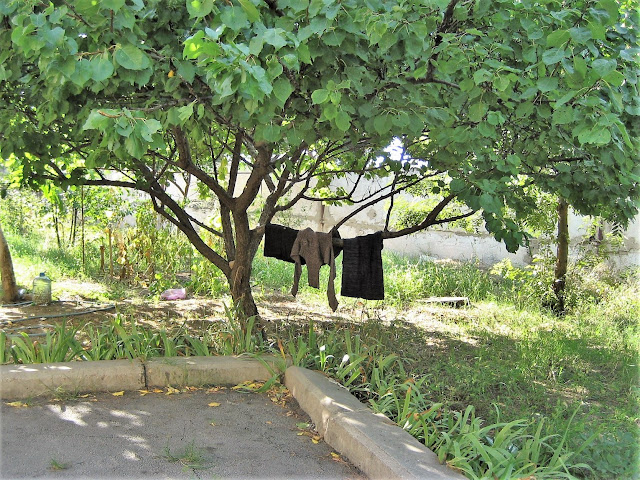 |
| El Paso laundromat. February 2019. |
While in my month's layover in El Paso, I offered my volunteer services to an El Paso organization that serves immigrants and refugees. A volunteer coordinator asked if I'd be able to do laundry.
Oh. My first thought was: That's not what I'd been expecting. Doing laundry is completely behind the scenes. No interaction with the folks being served, no direct observation of how my service impacted anyone. I'll even say this: No volunteer glory. Look, I'm doing good works! A stagehand and not an actor. Hell, not even a stagehand - a stagehand's assistant.
But in the very next moment, I laughed at myself and thought,
this is perfect. It is
exactly the kind of experience I should be having. And it's what the organization needs, so little ego girl, go sit down on that chair over there.
The romance of laundry
I like the word '
laundress.'
There's the movie
My Beautiful Laundrette, which, upon just now visiting a link about this movie, I realized I've never seen it, and had, in fact, confused its title and redemptive vibe with another movie,
Babette's Feast. "Ette" is a heady suffix.
There's the chi-chi restaurant in Napa Valley called
The French Laundry.
 |
| El Paso laundromat. February 2019. |
There's something saucy, naughty, about being a laundress, although I could be confusing that with the French maid thing.
There is the sensory pleasure of fresh-laundered sheets, now dry, snapping on a bendy clothesline on a sun-bright day, smelling of bleach and breeze, and feeling warm and firm to the hand as you stroke the smooth cotton fabric.
 |
| El Paso laundromat. January 2019. |
The unromantic view
Damn, it's dirty laundry. Not even mine, but someone else's.
I pick it up in aggressively industrial-like black trash bags, and when I return the laundry, clean, it is placed atop the somewhat-orderly heaps of other clean towels, sheets, blankets, pillowcases that line a hallway.
 |
| El Paso laundromat. February 2019. |
The soul of laundry
There was a TV show called
St. Elsewhere. Before it veered off the road with a masked-villain story arc, its wit and elegance of word and story put it among my lifetime favorites. (It was no surprise that the same creators later went on to parent the unparalleled
Northern Exposure.)
There was an episode in which a custodian was interviewed. The interviewer asked him about the drudgery, the unpleasantness - the menial nature - of cleaning up bodily fluids from floors, walls, surfaces, toilets - the blood, viscera, entrails, vomit, urine, feces, sputum, et al. The hospital custodian replied that it was - almost - sacred work to remove this human effluvia.
Or it could have been the TV show,
ER. Or in my creative memory.
These articles,
What You Can learn About Job Satisfaction from a Janitor, and
Want to Be Happier At Work: Learn How From These 'Job Crafters,' referenced the work of
Dr. Amy Wrzesniewski. She defined "job crafters," people with so-called menial jobs who perceive their work on a much higher plane of vision than what is in the HR job description. For example:
"[These individuals] didn’t see themselves as custodial workers at all. ... Some, when asked what their jobs were, would say 'I’m an ambassador for the hospital' or even, in one case, 'I’m a healer. I create sterile spaces in the hospital. My role here is to do everything I can to promote the healing of the patients.'”
I was impressed by the quality of the towels I washed, presumably all donated by area residents. Sure, there were a few that were a little worn, but by and large, these were thick and thirsty bath towels. How pleasurable, when so many things about one’s life as a refugee is uncertain, you can wrap your body in such a nice towel after a hot shower, or to dry off the skin of your little daughter or son after a good washing up.
A couple of blankets I washed were soiled with feces. A child, an adult? Illness? Stress? Fear? Age-related incontinence?
When I pulled warm pillowcases from the dryer, and folded them atop the laundromat's orange plastic counter, I found myself smoothing the tops of the just-folded covers, imagining the heads of children, teens, men, and women laying their heads on them, feeling safe, perhaps, on that night, as they laid on cots in one of the large, open rooms they shared with family, friends, and strangers.














